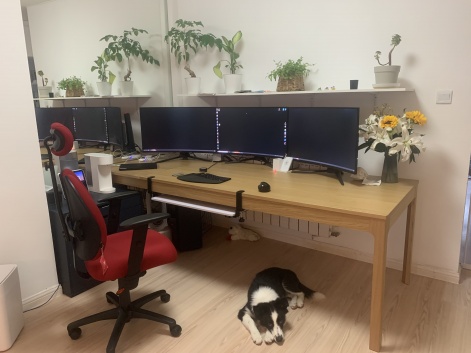The games industry plays host to a colourful cast of diverse individuals, from artists and coders to narrative designers and studio heads.
The skills to pull off these roles, however, are complex and differing, with each position requiring mastery in its field – especially in these complex times we are all living through at the minute.
To highlight some of the brilliant work that goes on behind the scenes as well as how employees around the world are adapting to the life of remote work, PocketGamer.biz is reaching out to the individuals who make up the games industry in our Jobs in Games: Remote Working series.
This week we spoke with ByteDance senior director of business development for gaming Tom Van Dam.
Note: This interview took part before President Trump signed an executive order to ban TikTok in the US.
PocketGamer.biz: Can you tell us about your current role and what it entails?
Tom Van Dam: Since the middle of 2019, I have been working at ByteDance as the senior director of global business for our gaming department, specifically the business development team, with a focus on Western markets.
I felt that I shouldn't do something too similar to what I enjoyed as a hobby, so overnight I applied for Economics and Finance instead.Tom Van Dam
My role is to bring our gaming initiatives to life and expand the business rapidly. That entails working with Western gaming companies to assess whether there are synergies between our respective plans and efforts and create partnerships. This can be about ByteDance providing publishing services in different regions worldwide, our studios bringing the next instalment of a franchise to market or perhaps being of assistance in a more strategic manner.
How did you first get into games and how did you progress into this role?
Well, it started with shareware games on 3.5-inch floppy disks, but I think we can fast forward to the point where I started professionally. This was actually in China, a place I really had wanted to go to upon finishing my university years.
I was really looking for an opportunity that would allow me to get to China, and it happened to be that a small Western-led development company in Beijing was open to giving me a shot based on the fact that I was an avid gamer and willing to relocate from Europe to China.
I was doing QA, writing game design documents and managing an online community at the same time. A very rich experience to start out with, working with both western and Chinese colleagues. Eventually, I did need to take a break to get my Chinese skills addressed, but the first gaming role was on my CV.
What did you study (if anything) to get your role? What courses would you advise for aspiring professionals in the area?
I did study, luckily, but it was fairly unrelated. Actually, during my teenage years, I was 100 per cent sure I would go for an IT major and my family was sure of it too, as I spent every night behind the computer. But when I posted the university application in the then still physical mailbox, it felt uncomfortable. I felt that I shouldn't do something too similar to what I enjoyed as a hobby, so overnight I applied for Economics and Finance instead.
In hindsight, one of the smartest choices in my life, because it gave me a broader perspective, it brought me to Asia for an exchange and it made me meet many internationally-minded friends. Later, I added a degree in negotiation as well, and those degrees combined gave me a good basis to work on projects with both a gamer and a commercial perspective.
So to answer the question, what courses would I advise? If project management and business development are your things, courses in finance and law will be very helpful. One of the courses that also helps me with my work to this day, was related to cultural communication.
In general, two areas of specialisation, I think, are what makes for a very good candidate. Knowing your games and the industry is obviously a great foundation. Add to that two specialisations like programming, finance, law, art, statistics and you should have a very desirable profile.
Do you think there are any misconceptions, public or professional, surrounding your area of expertise?
I do think that when you go to social events that are not specific to gaming, our industry is sometimes seen as less serious: "So you play games all day?". There is a hesitation to validate a career in gaming, even though it's such a valuable industry. It is getting much better though. If we compare the public perception from 10 years ago to today's, the progress is obvious.
Specifically, to business development, a lot of my colleagues over the years have told me that it must be such a dream job with all the travel. I think this is a case of the grass is always greener. Going somewhere for the first time is exciting, but going there for the 10th time is mostly an exercise in frustration with delayed flights, jetlag, being away from family and just very little time to enjoy where you are!
What advice do you have for someone looking for a job in this profession?
There are a few different profiles I think that would fit someone looking to work in business development, so if you fit any of these then it can serve as a basis to develop further skills. You either are very social and outgoing and connect with people easily.
You could also already have a strong existing network of gaming contacts, due to your years of experience in related fields. Alternatively, you have strong analytical capability or vision of where the industry should go and can use that for a targeted work approach.
How has the shift from office to remote working impacted your role, if at all?
The advantage is more flexibility in terms of arranging your work schedule and also being able to have the comfort of home amenities.Tom Van Dam
When the outbreak was nearing its height in Asia in early February, I was in the US awaiting GDC. The US had already closed the border to travellers from China so I decided to stay in San Francisco to be able to attend. But as GDC was cancelled, and subsequently US companies implemented their work-from-home policies, there was no point to stay there. I took one of the last remaining flights back to China, as the US situation was worsening quickly.
As I mentioned earlier, perhaps a challenging part of my role is the need to be on the road frequently, so in a normal situation, I work remote quite a bit. Our company provides excellent tools and software to make this efficient. In fact, the biggest challenge for me has been not being able to travel to our various offices and the offices of our partners.
So, while for me personally the impact of not being able to go to the office for a while was limited, I found myself also unable to meet with other companies and partners as they closed their offices. I think I am lucky to be in Shanghai at the moment, where life is mostly back to normal.
What does your typical day look like when working remotely?
I get up in the morning, get myself presentable for the first early Zoom calls of the day with US companies, proceed to answer the overnight emails by noon and in the afternoon spend most of my time working on internal projects and communication. In the evening, there might be some more calls, to accommodate all the time-zones. It's quite an advantage to save on commuting time - especially for those morning calls.
What do you think are the biggest advantages and disadvantages of remote working?
The advantage is more flexibility in terms of arranging your work schedule and also being able to have the comfort of home amenities. I also have welcomed a four-legged friend to the apartment, something inconceivable while business travel was the norm.
In terms of disadvantages, the lack of in-person face time with colleagues in the office, grabbing a meal or coffee together, does impact your perception of the job. You have to spend more effort to keep up with what's going on. Also, the lines between work/personal start to blur more. Something to be vigilant of.
Is there anything you wish you had known before moving to remote working?
I'd say the only thing that was really inconvenient is that I left different devices and paperwork in various office locations, and haven't been able to retrieve those. Had I known before; I would have tidied up better. I also purchased a portable gaming laptop for playing while on business travel, but it's now gathering dust at home, so that was a mistimed purchase.
Do you have any advice for others who are struggling to adjust to remote work?
When you get up in the morning, give yourself a break before starting work. Don't check your email or messages right away. Have some breakfast. Similarly, throughout the day, take a break here or there, do something you enjoy, like you were on lunch break. Don't sit behind the computer continuously.

Finally, call friends and colleagues and have more one-to-one conversations. People are much more open to chat now that they're more isolated from their regular circles!
After the pandemic ends and if you were given the choice, would you prefer to continue working remotely or go back to working in an office?
Remote-work with the option of visiting the office from time to time sounds pretty ideal for me. Being able to fly and connect with people around the world is still what's great about the job and what delivers efficient results. It also allows for a better balance between that crazy call schedule and being able to stay in a comfortable home. If we could just get those company meals sent to our front door!

















